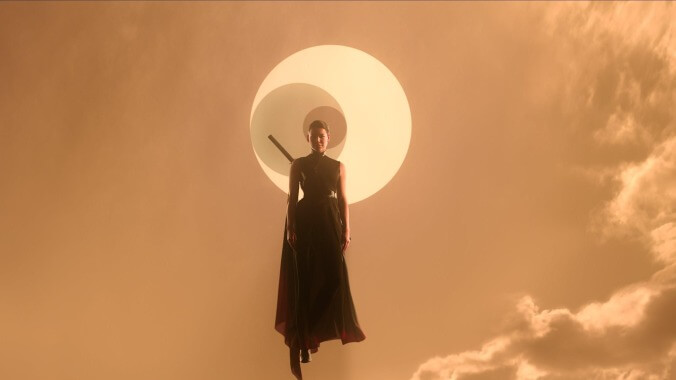3 Body Problem review: So is this the next Game Of Thrones?
No, Netflix’s heady sci-fi series isn’t that (which is just fine by us)

There’s no getting around the fact that 3 Body Problem comes to Netflix with a lot of baggage. It’s based on an international bestseller with legions of fans all over the world, and it’s not even the first adaptation of Liu Cixin’s Remembrance Of Earth’s Past series to come to TV screens. Add to that the expectations that come with being the first show executive producers David Benioff and D.B. Weiss have actively led since Game Of Thrones ended (rather divisively, as you may recall), and that’s a lot to overcome. The eight-episode series, which premieres March 21, seems well aware of its provenance, and is overly eager to please as a result. It may wear the garb of prestige television, but underneath it’s just a nerdy science-fiction show, with a healthy emphasis on the science.
Benioff and Weiss, who share showrunner duties on the series with Alexander Woo (True Blood, The Terror), had to know they’d be inviting Game Of Thrones comparisons when they cast popular GOT actors like John Bradley, Liam Cunningham, and Jonathan Pryce in major roles here. Luckily, their characters are different enough, and compelling enough, to make you forget all about their previous incarnations. That’s emblematic of the experience of watching the show as a whole. After a few episodes, you get so swept up in this world, in this story, that it exists all on its own, without the burden of past associations. It doesn’t matter what came before; you just want to know what’s coming next.
The story begins in Maoist China with a brilliant young astrophysicist named Ye Wenjie (Zine Tseng). After watching her father’s public execution for teaching concepts like relativity and the Big Bang theory to his university students during the Cultural Revolution, she becomes a political prisoner herself. By the time she’s recruited to work on the Red Coast Project, a secretive government program focused on sending signals to the cosmos, she’s lost all faith in humanity. Her disillusionment leads her to make a choice that will have world-changing ramifications far into the future.
We then fast-forward to modern-day London, where an investigator (Benedict Wong) is looking into a series of suicides by prominent scientists on behalf of a shadowy international organization. Meanwhile, a group of former Oxford students (played by Jovan Adepo, John Bradley, Eiza Gonzáles, Jess Hong, and Alex Sharp) become entangled in the mystery when their one-time physics professor throws herself into a particle accelerator. The unexplained deaths, the emergence of scientific irregularities in the field of theoretical physics, and an immersive VR game that challenges players to work through the unsolvable problem referenced in the title are all pieces of the complex puzzle 3 Body Problem puts before its audience.
Although the series deals with events on a cosmic scale, it mainly stays close to the ground with a few notable exceptions (the vast virtual world of the game being one of them). The characters have been combined, consolidated, and pulled from different volumes of the book trilogy. This rearrangement doesn’t really change how the story plays out; it just gives the writers more to work with. The script establishes that they are brilliant, but it’s not hard to follow their arcs and trains of thought. Without ever dumbing anything down (no one ever says, “In English, please” here) it deals with complex scientific concepts in a way that doesn’t distract from the storytelling. You simply understand that they understand what they’re talking about, and that’s all you need to know. It may jump around in time and space, but it’s never confusing. And with a cast of characters this big, that’s saying something.
The biggest drawback of 3 Body Problem is its insistence on taking itself so seriously. There are some witty lines of dialogue here and there—mostly delivered by Wong, easily the standout among this ensemble—yet even in the scenes set in the fantastical world of the game you can feel the creators holding back their more playful instincts. The visual effects are indeed impressive, but where the images should be lively and colorful, they’re solemn and washed out. Composer Ramin Djawadi (whose many credits include Game Of Thrones) adds to that impression with his score, full of low strings and somber piano melodies. High stakes must be conveyed with high drama, so the mantra of prestige TV goes. But there’s nothing wrong with leaning into the sillier elements of the science-fiction genre. Not everything has to be elevated to be good.
Another limitation—one that’s out of the hands of the producers—is the way Netflix is releasing the series. The streamer’s stubborn insistence on sticking to their signature binge model may have an adverse effect on its reception among fans and casual viewers alike. This is exactly the kind of dense, episodic storytelling that benefits from being spread out over several weeks. It takes a little time to get under your skin. With all the episodes dropped at once, though, it becomes unnecessarily difficult to have discussions about the twists and plot developments with friends and family who are watching at their own pace. No one should be expected to take it all in in one sitting, though there’s bound to be some who will try. You’ll recognize them by the dark circles under their eyes and the way they keep glancing up at the stars. And with a show this watchable, it’s an understandable impulse.
3 Body Problem premieres March 21 on Netflix